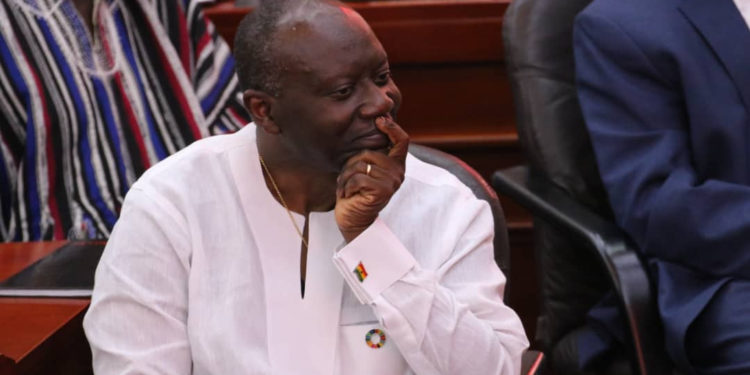E-Levy Bill Passage: A return to the good books of investors, rating agencies?
Ghana, with the onset of the Covid pandemic in the last two years has faced some severe economic challenges.
Already a low-revenue mobilisation state with a tax-to-GDP ratio of about 12 percent, the further drop in revenue as a result of the pandemic necessitated the acquisition of loans to help bridge the fiscal deficit gaps created by the pandemic.
However, an insatiable taste for loans amid the pandemic, exacerbated the already large and debt-distressed economy, increasing the country’s debt-to-GDP stock to over 77 percent [now 80.1% of GDP].
The country’s unsustainable public debt, low revenue mobilisation, high fiscal deficits, increased interest payments coupled with a projected upward trend in the country’s debt stock resulted in Ghana’s loss of access to the international market, yield spreads in its Eurobond issues and a downgrade of its credit rating by Moody’s and Fitch Ratings.
In its rating of Ghana’s creditworthiness, Fitch Ratings averred serious fiscal measures such as cuts in expenditure and increase in tax revenue mobilisation as a percentage of GDP will help restore the country to debt sustainability, restore investor confidence in the economy and market access as well as improve its credit ratings.
Hence to ensure debt sustainability, restore confidence in the economy and return to the international debt market, government through the Finance Minister announced the introduction of the Electronic Transaction Levy (E-Levy) during the presentation of the 2022 budget.
With no access to the international market, government is unable to borrow to finance its expenditure, hence the acceptance and passage of the E-Levy by the Parliament was going to provide the government the badly needed revenue to finance its fiscal deficit, tame its insatiable appetite for borrowing and send signals to the global investing public that the country has what it takes to raise extra revenue to meet its debt obligations to investors.
In furtherance of government’s commitment to ensuring debt sustainability, restoring confidence in the economy and a possible return to the international market, government announced a 20% quarterly reduction in its GHS 135bn budgeted expenditure for the 2022 fiscal year.
The expenditure cut was welcomed by the global investing community, as it once again showed investors Ghana’s commitment to reducing its fiscal deficit and ultimately reducing its large debt stock.
Recently, and to be more specific on Thursday, March 24, 2022, the Finance Minister announced further expenditure cutting measures put in place by government to reduce its large discretionary expenditure.
Now some would argue that, the GHS 3.5bn expenditure cutting measures by government was in response to the recent hardships faced by Ghanaians as a result of the adverse impacts of the worsening local currency – cedi – and increasing prices of crude oil on the international market, which saw the cedi record a depreciation rate of 14.6% at mid-March 2022 and more than 50% increment in fuel price at the pumps.
Be that as it may, and although it is not wrong for persons to think so, the expenditure cuts as alluded to the Finance Minister during the press briefing is to help improve the macroeconomic conditions of the country and is in pursuit of government’s ability to achieve the set 7.4% fiscal deficit for the 2022 fiscal year.
Now, it is my opinion that the expenditure cuts recently announced by government forms part of its plans to restore investor confidence in the economy and to return to the international capital market, because if really it was about addressing for instance the fuel price increments at the pumps, government wouldn’t give a 1.6% and 1.4% reduction in prices of diesel and petrol as a way of cushioning Ghanaians knowing very well that ex-pump prices had increased well over 50% since the start of the year.
So now the big question I find myself contemplating is this; given the 20% (now 30%) quarterly cut in expenditure, the additional expenditure cuts announced by the Finance Minister which is expected to save Ghana some GHS 3.5bn, and the much-awaited passage of the E-Levy bill, does it give Ghana the opportunity to return to the international market? Is Ghana now in the good books of investors and does Ghana get to see its credit rating upgraded?
Has foreign investor confidence been restored into the economy? Should there be a new Eurobond issuance by Ghana this year, are foreign investors willing to subscribe to it and possibly oversubscribe it as has been the case almost anytime Ghana issues a bond on the international market?
In my personal view, I think the passage of the E-Levy will put Ghana in a good light in the eyes of investors, the global investing public and international credit rating agencies I believe, will respond positively to the passage of the E-Levy Bill.
But will it be enough to undo all the damage that has been done to the country’s economic reputation in the last few years? Time, they say is the better judge, time will tell, let’s wait and see.
The writer is the Editor of NorvanReports
For clarifications, questions or submissions the writer can be reached via dodoofuaad84@gmail.com








